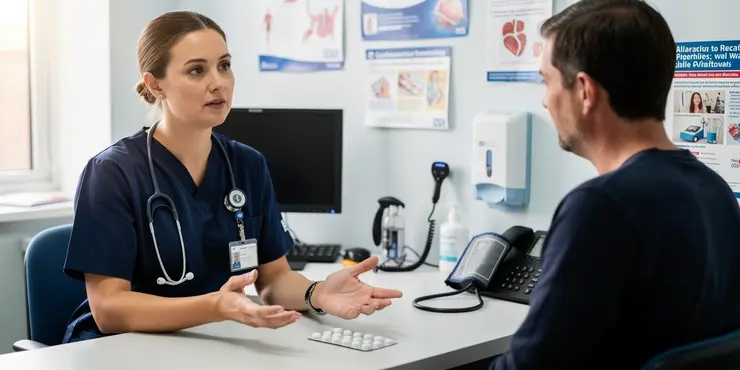
Find Help
More Items From Ergsy search
-
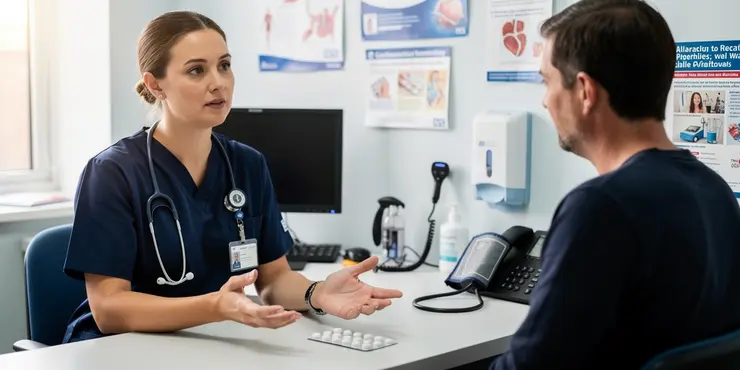
Should people with a family history of colorectal cancer take aspirin?
Relevance: 100%
-
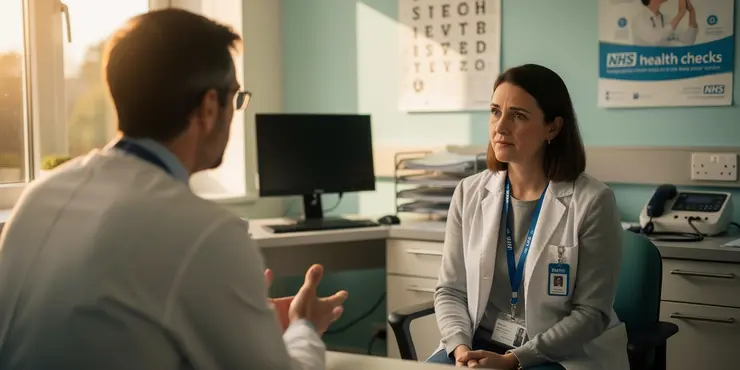
Can aspirin stop colorectal cancer?
Relevance: 81%
-
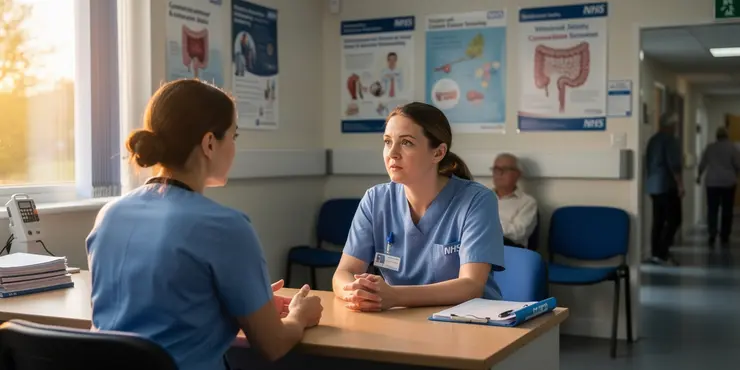
Is aspirin recommended for everyone to prevent colorectal cancer?
Relevance: 79%
-
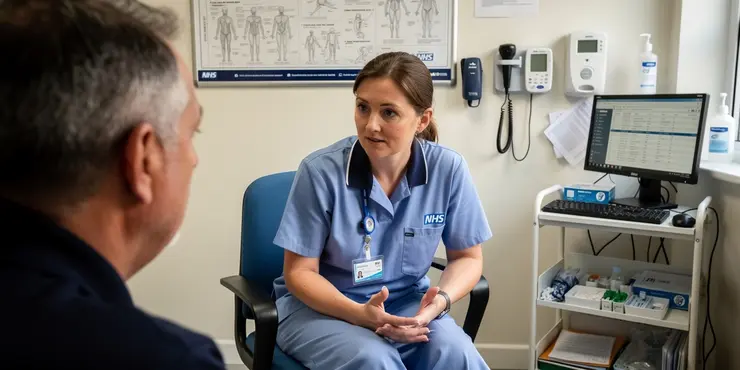
Has aspirin been proven to cure colorectal cancer?
Relevance: 72%
-
Is aspirin more effective for certain age groups in preventing colorectal cancer?
Relevance: 69%
-
Is aspirin effective in preventing other types of cancer?
Relevance: 60%
-
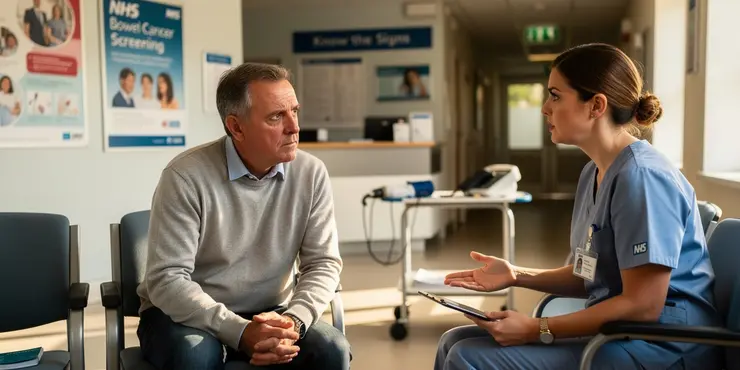
What is colorectal cancer?
Relevance: 59%
-
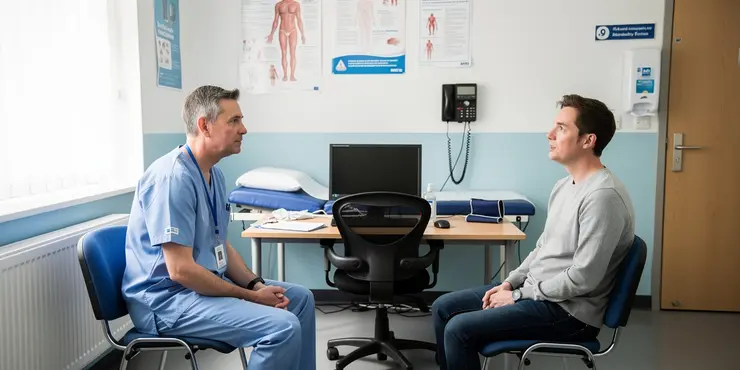
What should I do if I'm considering aspirin for cancer prevention?
Relevance: 59%
-
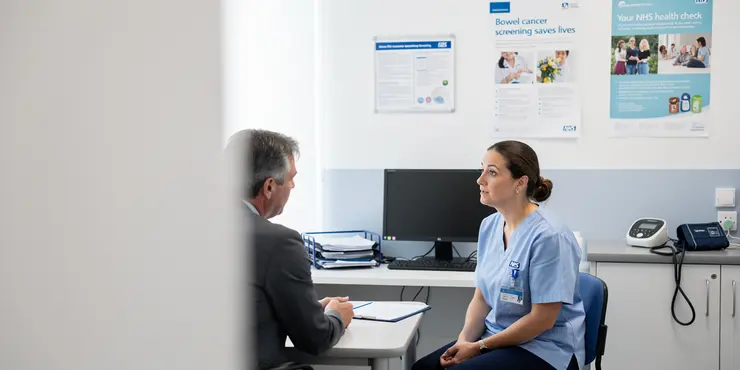
Taking a Genetic Family History - The Conversation (Bowel Cancer)
Relevance: 57%
-
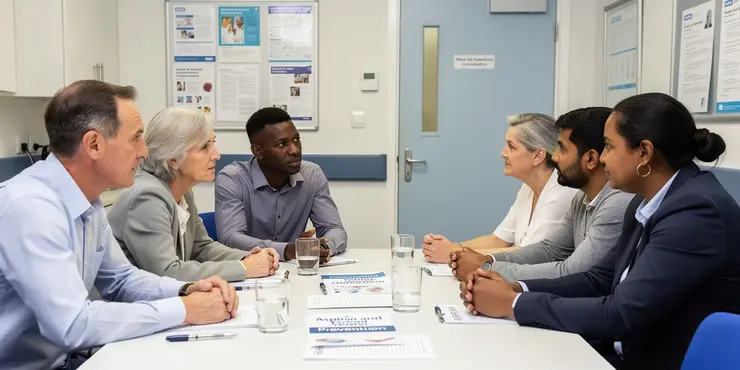
Can aspirin prevent colorectal cancer?
Relevance: 57%
-
How long do studies suggest taking aspirin for cancer prevention?
Relevance: 56%
-
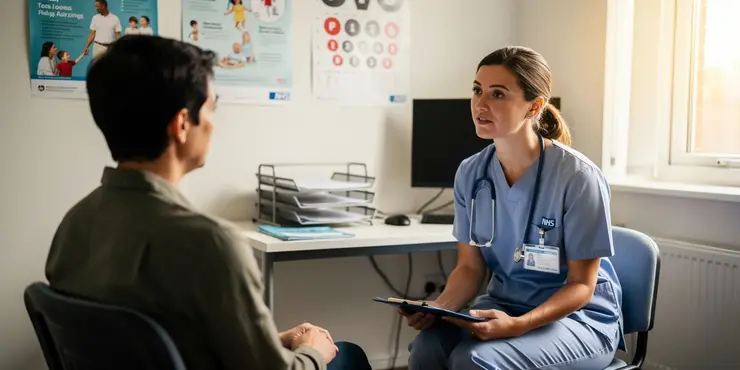
How does family history affect the risk of bowel cancer?
Relevance: 55%
-
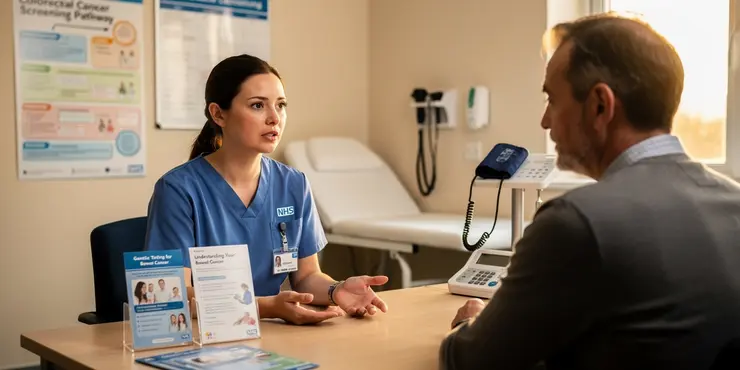
Is genetic testing available for colorectal cancer?
Relevance: 55%
-
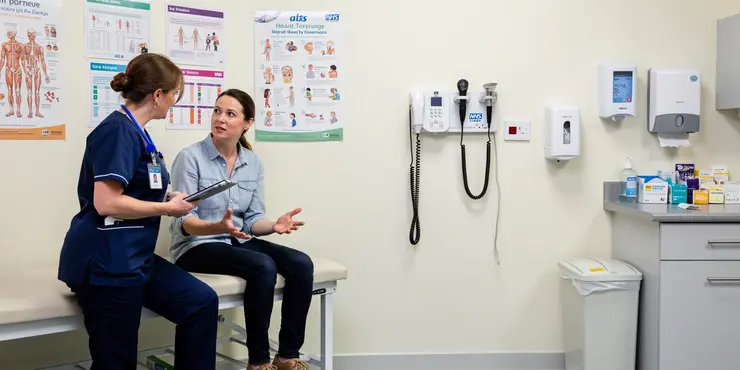
What dosage of aspirin is considered effective for cancer prevention?
Relevance: 55%
-
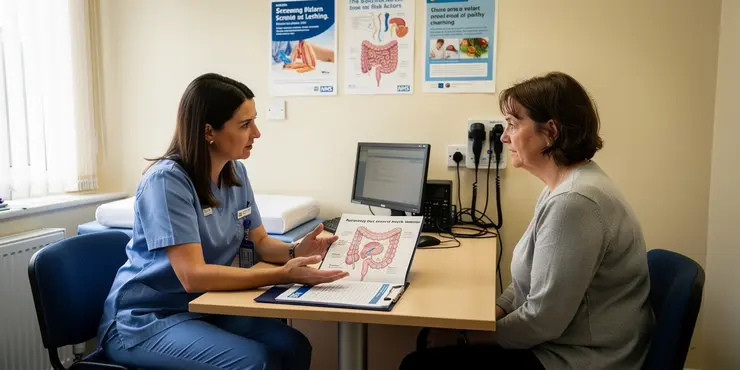
What factors increase my risk of colorectal cancer?
Relevance: 54%
-

How does aspirin work to reduce cancer risk?
Relevance: 54%
-
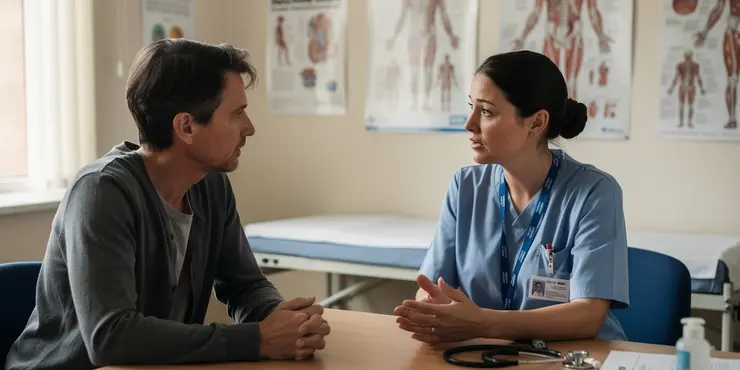
What do health organizations say about aspirin and cancer prevention?
Relevance: 53%
-
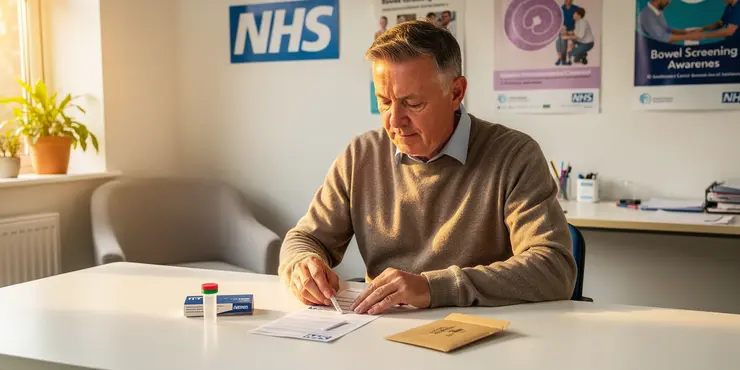
What are the recommendations for colorectal cancer screening?
Relevance: 52%
-
Are there ongoing studies about aspirin and colorectal cancer?
Relevance: 51%
-
Has the FDA approved aspirin for cancer prevention?
Relevance: 51%
-
Are there risks associated with home colorectal cancer tests?
Relevance: 48%
-
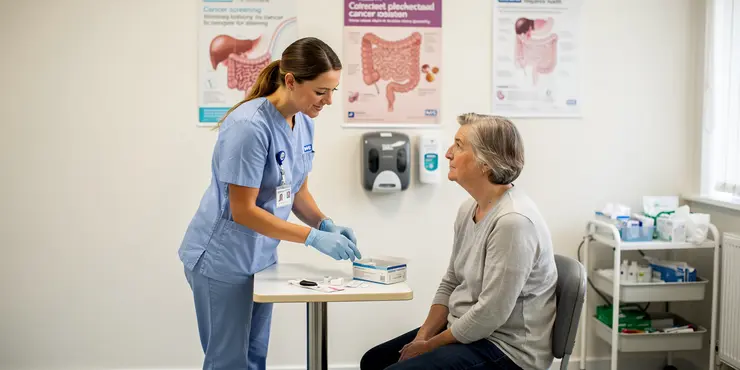
Can home colorectal cancer tests replace a colonoscopy?
Relevance: 47%
-
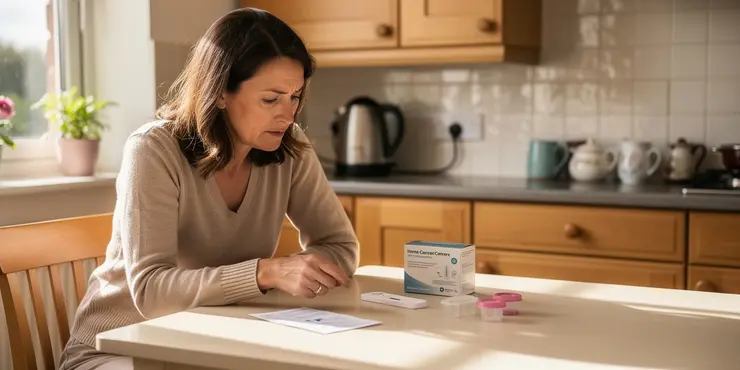
How often should I perform a home colorectal cancer test?
Relevance: 46%
-
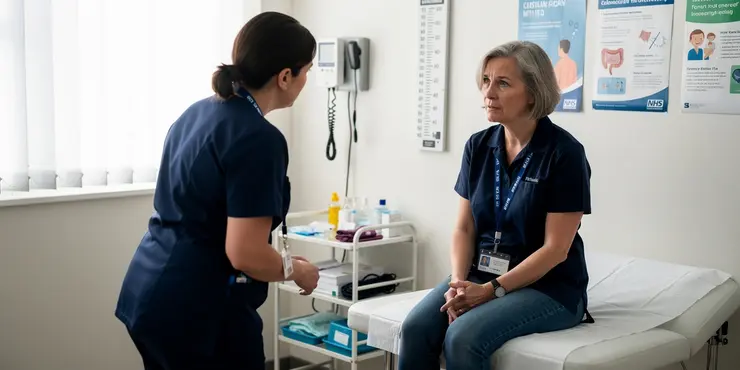
How can I test myself for colorectal cancer?
Relevance: 46%
-
Can lifestyle changes also help prevent colorectal cancer?
Relevance: 46%
-
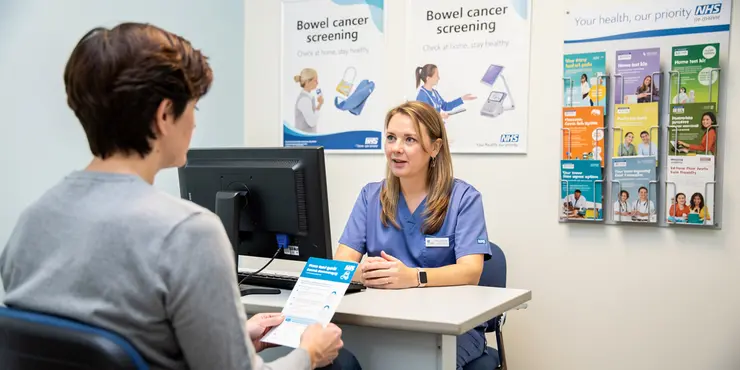
Will insurance cover the cost of home colorectal cancer tests?
Relevance: 43%
-
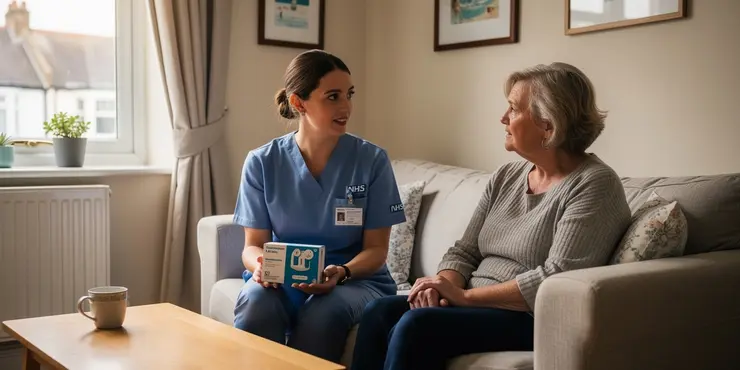
What are the advantages of an at-home colorectal cancer test?
Relevance: 42%
-
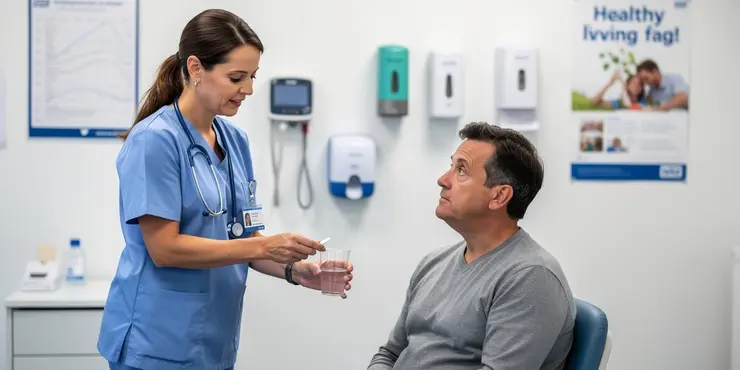
What is Aspirin?
Relevance: 35%
-
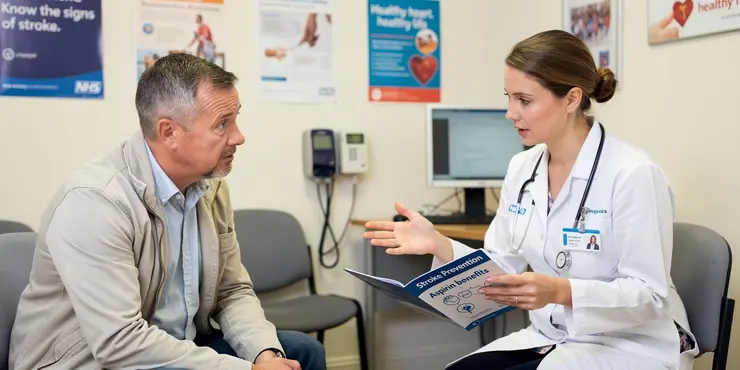
Can aspirin help in reducing the risk of strokes?
Relevance: 33%
-
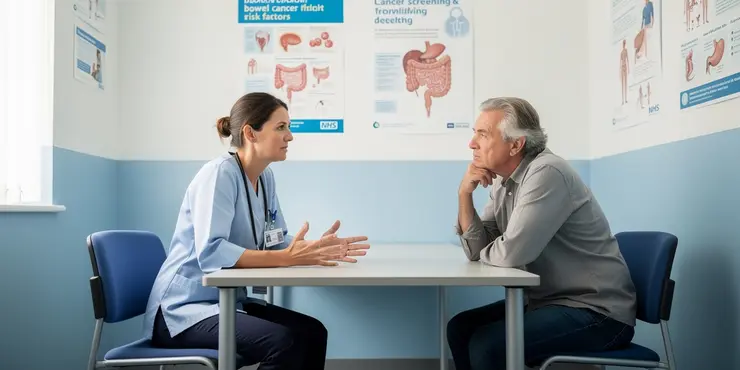
What are the risk factors for bowel cancer?
Relevance: 33%
-
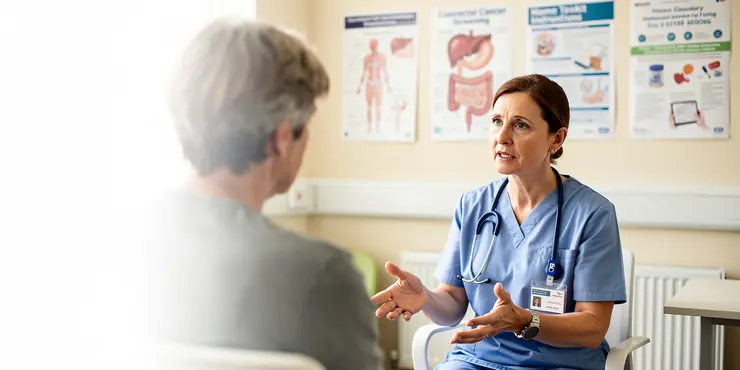
Are home tests for colorectal cancer accurate?
Relevance: 32%
-
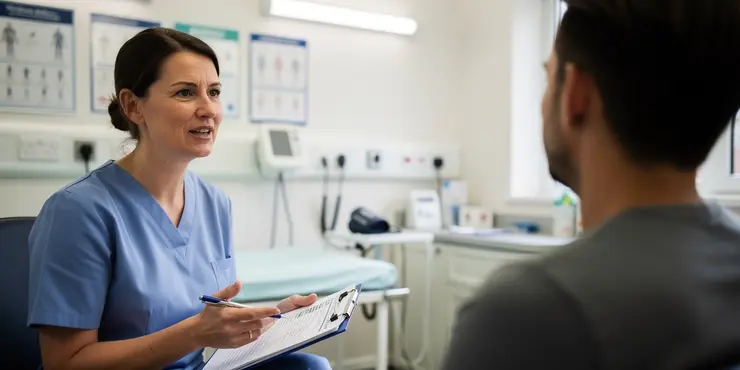
What are the side effects of Aspirin?
Relevance: 32%
-
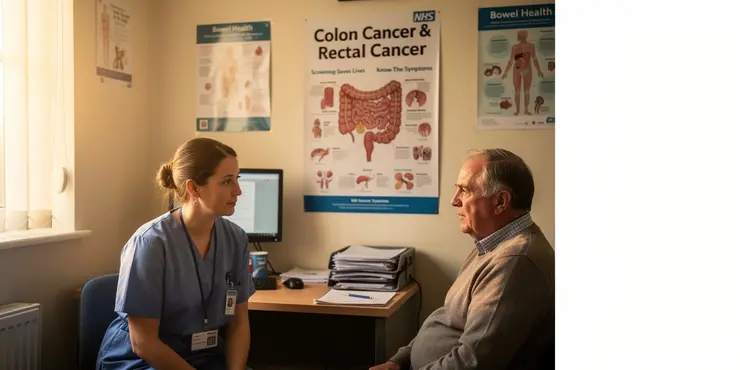
What is the difference between colon cancer and rectal cancer?
Relevance: 32%
-
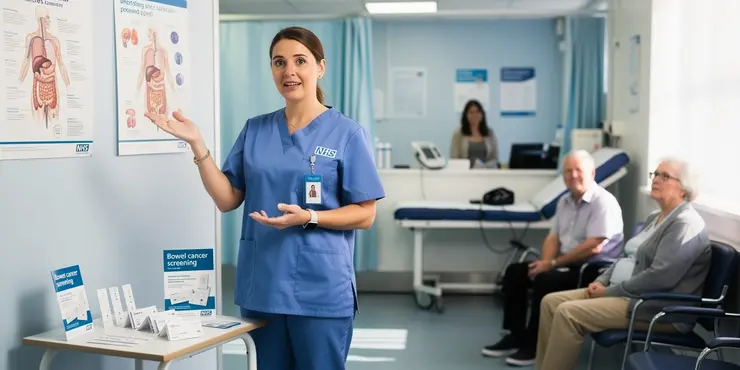
What are the main methods for testing yourself for colorectal cancer?
Relevance: 32%
-

Are Aspirin and Ibuprofen the same?
Relevance: 31%
-
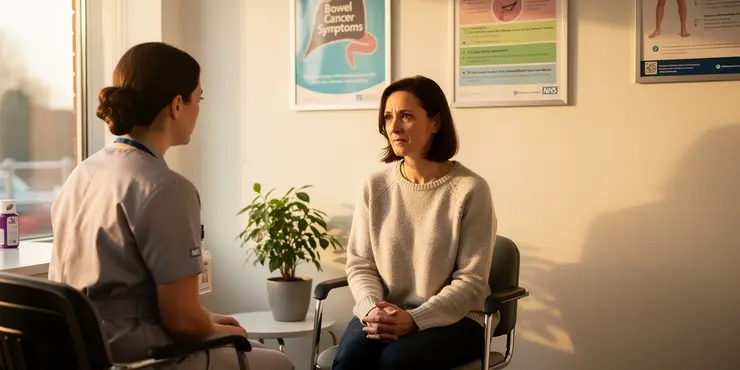
What is Bowel Cancer?
Relevance: 31%
-
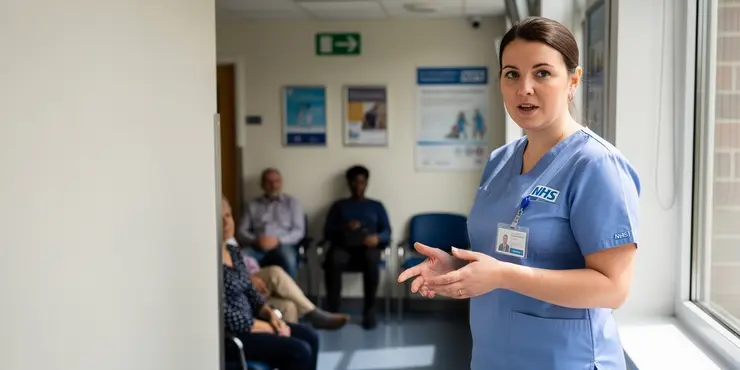
At what age should I start testing myself for colorectal cancer?
Relevance: 31%
-
Can aspirin interact with other medications?
Relevance: 31%
-
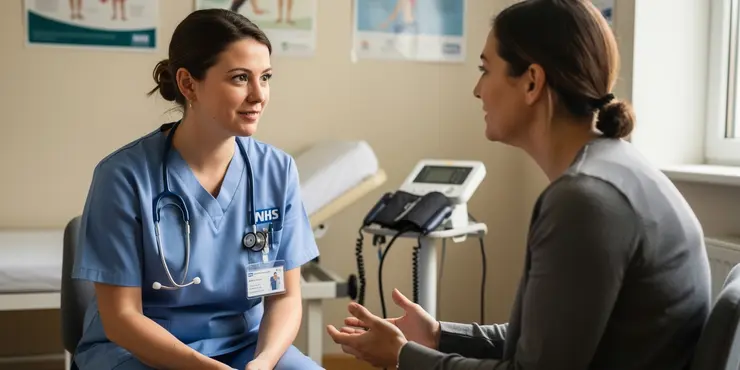
How common is bowel cancer?
Relevance: 31%
-
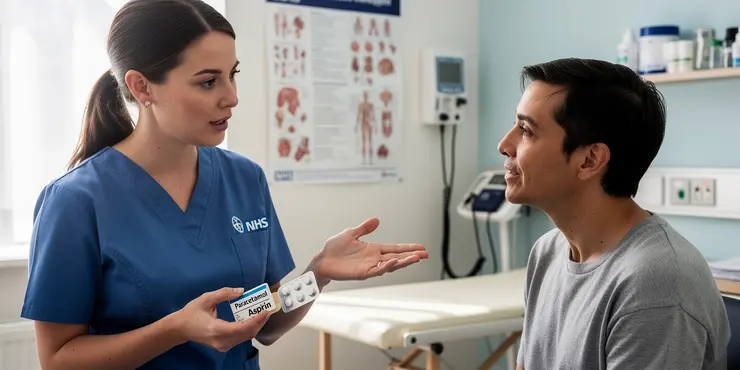
Is Paracetamol the same as Aspirin?
Relevance: 31%
Understanding Colorectal Cancer and Family History
Colorectal cancer is a significant health issue in the UK, affecting thousands of individuals each year. Family history plays a crucial role in determining the risk of developing this disease. People with close relatives who have had colorectal cancer are at a higher risk themselves, making it essential for them to explore preventive measures. One such measure can be the use of aspirin, a common medication that may provide certain protective benefits against the development of colorectal cancer.
The Role of Aspirin in Cancer Prevention
Aspirin, traditionally used as a pain reliever and anti-inflammatory medication, has garnered attention for its potential cancer-preventive properties. Scientific studies have indicated that regular aspirin use may reduce the risk of colorectal cancer by inhibiting the growth of cancerous cells and promoting apoptosis, which is the programmed death of damaged cells. This effect is believed to be related to aspirin's ability to reduce inflammation, a known factor in cancer development.
Benefits of Aspirin for High-Risk Individuals
For individuals with a family history of colorectal cancer, the potential benefits of taking aspirin may be particularly significant. Regular use of low-dose aspirin could potentially lower the risk of developing colorectal cancer by as much as 20-40%, according to some studies. This can be an important consideration for those carrying genetic predispositions, where lifestyle modifications alone might not sufficiently mitigate risk.
Risks and Considerations
Despite its potential benefits, aspirin is not without risks. Long-term use can lead to gastrointestinal issues, such as ulcers and bleeding, particularly in individuals with a predisposition to stomach problems. It is therefore crucial for anyone considering aspirin as a preventive measure to consult with healthcare professionals. Doctors will weigh the benefits against the risks based on the individual's health history, genetic factors, and other medications they may be taking.
Guidelines for Aspirin Use
The decision to use aspirin should be made on a case-by-case basis, particularly for those with a family history of colorectal cancer. In the UK, guidelines regarding the use of aspirin for cancer prevention may vary, and health professionals often recommend it only if the benefits outweigh the risks. Patients are usually advised to undertake a health assessment, which includes reviewing cardiovascular risks and any history of gastrointestinal issues, before starting a regimen of aspirin.
Conclusion
For individuals with a family history of colorectal cancer, aspirin may offer a viable option for reducing cancer risk. However, this must be carefully balanced against potential health risks. Engaging in regular screenings and adopting a healthy lifestyle, alongside professional medical advice, remains crucial in colorectal cancer prevention. Individuals should engage in discussions with their healthcare providers to arrive at an informed decision that best addresses their unique health circumstances.
Colorectal Cancer and Family History
Colorectal cancer is a big health problem in the UK. It affects many people every year. If someone in your family had colorectal cancer, you may have a higher chance of getting it too. This means it's important to find ways to prevent it. Taking aspirin might help protect against getting colorectal cancer.
How Aspirin Helps Prevent Cancer
Aspirin is a medicine often used to help with pain and swelling. It might also help prevent cancer. Some studies say taking aspirin regularly might lower the chance of getting colorectal cancer. It does this by stopping cancer cells from growing and helping the body get rid of damaged cells. Aspirin can reduce swelling, which is linked to cancer.
Benefits of Aspirin for High-Risk People
If your family has had colorectal cancer, taking aspirin might help you a lot. Using a small dose of aspirin regularly might cut down the risk of getting colorectal cancer by up to 20-40%. This is very important for people who have a higher risk due to their genes.
Risks and Things to Think About
Aspirin can have risks too. Using it for a long time might cause stomach problems like ulcers or bleeding. This is why it's important to talk to a doctor before starting aspirin. The doctor will see if aspirin is good for you by checking your health and other medicines you take.
Advice on Using Aspirin
Deciding to take aspirin should be personal, especially if your family had colorectal cancer. In the UK, rules about aspirin use may be different. Doctors suggest it only if it helps more than it might harm. Before taking aspirin, doctors usually check your heart health and stomach issues.
Conclusion
If your family had colorectal cancer, aspirin might help lower your cancer risk. But, it's important to think about health risks too. Regular check-ups and healthy living are important in stopping colorectal cancer. Always talk to your doctor to make the best choice for your health.
Frequently Asked Questions
What is colorectal cancer?
Colorectal cancer is a type of cancer that starts in the colon or rectum, parts of the large intestine.
How does a family history affect the risk of colorectal cancer?
A family history of colorectal cancer can increase an individual's risk due to shared genetics and environmental factors.
What role does aspirin play in colorectal cancer prevention?
Aspirin has been shown to reduce inflammation and may lower the risk of developing colorectal cancer by inhibiting certain enzymes involved in tumor growth.
Are there any guidelines for aspirin use for colorectal cancer prevention?
Some guidelines suggest aspirin use for individuals with a high risk of colorectal cancer, but this should be determined by a healthcare professional.
Can aspirin completely prevent colorectal cancer?
While aspirin can reduce the risk, it does not completely prevent colorectal cancer and should be part of a broader risk-reduction strategy.
What are the potential side effects of taking aspirin regularly?
Regular aspirin use can lead to side effects such as gastrointestinal bleeding, ulcers, and increased risk of bleeding.
How much aspirin is recommended for colorectal cancer prevention?
The optimal dose varies; it is crucial to consult a healthcare provider to determine the appropriate dose for individual risk factors.
Should everyone with a family history of colorectal cancer take aspirin?
Not everyone should take aspirin; a healthcare provider should evaluate the risks and benefits based on personal medical history.
What factors need to be considered before starting aspirin for cancer prevention?
Factors include personal and family medical history, risk of bleeding, current medications, and overall health.
Are there alternatives to aspirin for reducing colorectal cancer risk?
Other strategies include regular screening, a healthy diet, physical activity, and avoiding smoking and excessive alcohol consumption.
Is aspirin use more effective than lifestyle changes in preventing colorectal cancer?
Aspirin can complement lifestyle changes, but it is not necessarily more effective than a comprehensive approach including diet and exercise.
How long does it take for aspirin to have an effect on colorectal cancer risk?
Aspirin's protective effects generally occur over the long term and may take years to manifest.
Do all doctors recommend aspirin for patients with a family history of colorectal cancer?
Recommendations can vary; it is important to have a personalized discussion with a healthcare provider.
What if someone has a contraindication to aspirin?
If aspirin is contraindicated, alternative strategies and medications should be considered in consultation with a healthcare provider.
Is there any specific age group that benefits more from aspirin for colorectal cancer prevention?
Aspirin benefits might vary by age, typically considered for those at higher risk starting at a certain age, often around 50, but guidelines vary.
Has research conclusively proven aspirin reduces colorectal cancer incidence?
Research supports a protective effect, but results can vary, and long-term studies continue to analyze its benefits and risks.
How should individuals with a family history of cancer approach aspirin therapy?
They should discuss the risks and benefits with their healthcare provider to make an informed decision based on personal and familial risk factors.
What are some symptoms of colorectal cancer to watch for?
Symptoms can include changes in bowel habits, blood in stool, abdominal pain, weight loss, and fatigue.
Is genetic testing recommended for someone with a family history of colorectal cancer?
Genetic testing might be recommended to identify inherited risks, like Lynch syndrome, and should be discussed with a healthcare provider.
Can lifestyle modifications reduce the need for aspirin in colorectal cancer prevention?
Healthy lifestyle changes can significantly reduce risk and potentially lessen the need for aspirin, depending on individual risk factors.
What is bowel cancer?
Bowel cancer is when bad cells grow in the bowel. The bowel is a tube in your belly that helps take out food your body doesn't need after eating.
This type of cancer is also called colorectal cancer. It starts in the colon or the rectum, which are parts of the bowel.
If you want to learn more, you can use pictures or videos to help. Talking with a doctor or nurse can also be a good idea.
Colorectal cancer is a kind of cancer. It begins in the colon or rectum. These are parts of the big intestine in your body.
How does a family history affect the chance of getting bowel cancer?
If someone in your family had colorectal cancer, it might mean you have a higher chance of getting it too. This can happen because of the genes you share with your family and the way you live together.
How does aspirin help stop bowel cancer?
Aspirin is a medicine. It can help stop cancer in the bowel. Bowel cancer is also called colorectal cancer.
Here is how aspirin helps:
- Aspirin can lower swelling in the body.
- It can stop some cells from growing into cancer.
- Doctors sometimes tell people to take aspirin to help stop cancer.
If you have questions, ask a doctor or a nurse.
Using picture guides or videos can help understand more.
Aspirin can help with swelling and might make it less likely to get a type of cancer in the bowel. It does this by stopping some enzymes that help tumors grow.
Can aspirin help to stop bowel cancer?
Aspirin is a medicine. Some people think it stops bowel cancer.
Doctors have rules about using aspirin. They can tell you if it is safe for you.
If you have questions, talk to a doctor. They can help you.
Some guidelines say people in danger of getting bowel cancer might take aspirin. But only a doctor should decide if this is right for you.
Does aspirin stop bowel cancer?
Aspirin can help lower the risk of getting bowel cancer. But it can't stop it completely. It should be one of many ways to stay healthy.
What can happen if you take aspirin often?
Taking aspirin often can cause problems. It might make your tummy hurt, give you ulcers, or make you bleed more easily.
How much aspirin should I take to help stop bowel cancer?
Aspirin can help stop bowel cancer.
Talk to your doctor first.
Your doctor can tell you how much aspirin to take.
Remember to ask questions if you are not sure.
Use pictures or videos if they help you understand better.
The best amount of medicine can be different for every person. It is important to talk to a doctor or nurse to find out the right amount of medicine for you.
Should people with colon cancer in their family take aspirin?
If your family has had colon cancer, you might wonder if you should take aspirin to help. It's important to ask a doctor first. They can give you the best advice for your health.
Some things that can help:
- Talk to your doctor about what's best for you.
- Read simple guides or stories about health.
- Use apps that explain health things in a simple way.
Not everyone should take aspirin. A doctor needs to check if it is safe for you based on your health.
What should you think about before taking aspirin to help stop cancer?
There are a few things to think about. These include:
- Your own medical history.
- Your family’s medical history.
- If you have a chance of bleeding.
- Any medicines you take now.
- Your overall health.
If you need help, try using picture supports or talk to someone you trust who can explain things. They might use simple words or drawings.
What else can you take instead of aspirin to lower the chance of bowel cancer?
There are other ways to stay healthy. You can have regular check-ups with your doctor. Eat healthy food. Exercise and move your body. Don't smoke and don't drink too much alcohol.
Is taking aspirin better than changing how you live for stopping bowel cancer?
This question asks if taking a pill called aspirin helps more than lifestyle changes, like eating healthy food or exercising, to stop a type of cancer in the bowel.
Here are some ways to help understand:
- Use pictures: Look at pictures that explain how aspirin works and what lifestyle changes mean.
- Talk with others: Discuss the question with someone you trust, like a family member or friend.
- Use simple words: Break down big words into smaller, easy words you know.
It's okay to ask for help if you don't understand something!
Aspirin can help you, but it is not better than making changes like eating healthy food and exercising.
How long does aspirin take to help stop bowel cancer?
Aspirin can help lower the chance of getting bowel cancer.
But it takes some time to start working.
It might take a few years for aspirin to help.
If you want to know more, talk to a doctor.
You can also use tools like picture stories or videos to help understand.
Aspirin helps protect your health, but it takes a long time to work. It might take years to see the benefits.
Do all doctors say to take aspirin if your family has had bowel cancer?
Recommendations can be different for each person. It is important to talk with a doctor or nurse to find out what is best for you.
What if someone cannot take aspirin?
Some people should not take aspirin because it can make them sick. If someone cannot take aspirin, they should talk to their doctor.
The doctor might give them a different medicine that is safe for them.
Here are some things that can help:
- Ask the doctor questions if you do not understand.
- Use pictures to remember what the doctor says.
- Write down the doctor's advice in simple words.
If you can't take aspirin, talk to your doctor. They can help you find other medicines or ways to stay healthy.
Which age group gets the most help from aspirin to stop bowel cancer?
Aspirin can help some people, but it depends on how old you are. It's usually a good idea for people who might get sick more easily when they are around 50 years old. But different doctors might say different things.
Does research show aspirin lowers the chance of getting bowel cancer?
Scientists study aspirin to see if it helps prevent bowel cancer. They are still looking for clear answers. Using tools like pictures or videos may help you understand better.
Studies show it might help protect, but results are different. Scientists are still looking at the long-term benefits and risks.
What should people do if their family has had cancer and they are thinking about taking aspirin?
If someone in your family has had cancer, you might think about taking aspirin. Talk to your doctor first. They can help you decide if aspirin is a good idea for you.
Aspirin can help some people, but it also has risks. Your doctor will know what is best for your health.
Use a notebook to write down any questions you have. Take this with you when you see your doctor. You can also ask a friend or family member to go with you to the appointment. They can help you remember what the doctor says.
They should talk with their doctor about the good and bad things. This will help them make a smart choice. They should think about their own health and their family’s health.
What signs of bowel cancer should you look for?
Here are some signs to watch for:
- Tummy pain
- Blood in your poo
- Pooing more or less than usual
- Feeling very tired
- Losing weight without trying
If you notice any of these signs, tell a doctor.
It might help to use picture cards or apps to understand these signs better.
Signs that something might be wrong include:
- Going to the toilet more or less often.
- Blood when you go to the toilet.
- Tummy hurts.
- Losing weight without trying.
- Feeling very tired.
It can help to talk to someone if you're worried. Using pictures or writing things down can also help you understand better.
Should you get a genetic test if your family has had colorectal cancer?
Doctors might suggest a special test called genetic testing. This test looks for changes in your genes that can be passed down from parents. These changes might increase the chance of getting certain illnesses, like Lynch syndrome. It is important to talk about this test with your doctor so they can explain it to you. If reading is hard, you can ask someone to help you or use tools like text-to-speech apps to read the words out loud.
Can changing how we live help us not need aspirin to prevent bowel cancer?
Changing how we live to be healthier can help us be sick less often. This might mean we do not need to take aspirin. It depends on how likely we are to get sick.
Useful Links
This website offers general information and is not a substitute for professional advice.
Always seek guidance from qualified professionals.
If you have any medical concerns or need urgent help, contact a healthcare professional or emergency services immediately.
Some of this content was generated with AI assistance. We’ve done our best to keep it accurate, helpful, and human-friendly.
- Ergsy carfully checks the information in the videos we provide here.
- Videos shown by Youtube after a video has completed, have NOT been reviewed by ERGSY.
- To view, click the arrow in centre of video.
- Most of the videos you find here will have subtitles and/or closed captions available.
- You may need to turn these on, and choose your preferred language.
- Go to the video you'd like to watch.
- If closed captions (CC) are available, settings will be visible on the bottom right of the video player.
- To turn on Captions, click settings .
- To turn off Captions, click settings again.
More Items From Ergsy search
-

Should people with a family history of colorectal cancer take aspirin?
Relevance: 100%
-

Can aspirin stop colorectal cancer?
Relevance: 81%
-

Is aspirin recommended for everyone to prevent colorectal cancer?
Relevance: 79%
-

Has aspirin been proven to cure colorectal cancer?
Relevance: 72%
-
Is aspirin more effective for certain age groups in preventing colorectal cancer?
Relevance: 69%
-
Is aspirin effective in preventing other types of cancer?
Relevance: 60%
-

What is colorectal cancer?
Relevance: 59%
-

What should I do if I'm considering aspirin for cancer prevention?
Relevance: 59%
-

Taking a Genetic Family History - The Conversation (Bowel Cancer)
Relevance: 57%
-

Can aspirin prevent colorectal cancer?
Relevance: 57%
-
How long do studies suggest taking aspirin for cancer prevention?
Relevance: 56%
-

How does family history affect the risk of bowel cancer?
Relevance: 55%
-

Is genetic testing available for colorectal cancer?
Relevance: 55%
-

What dosage of aspirin is considered effective for cancer prevention?
Relevance: 55%
-

What factors increase my risk of colorectal cancer?
Relevance: 54%
-

How does aspirin work to reduce cancer risk?
Relevance: 54%
-

What do health organizations say about aspirin and cancer prevention?
Relevance: 53%
-

What are the recommendations for colorectal cancer screening?
Relevance: 52%
-
Are there ongoing studies about aspirin and colorectal cancer?
Relevance: 51%
-
Has the FDA approved aspirin for cancer prevention?
Relevance: 51%
-
Are there risks associated with home colorectal cancer tests?
Relevance: 48%
-

Can home colorectal cancer tests replace a colonoscopy?
Relevance: 47%
-

How often should I perform a home colorectal cancer test?
Relevance: 46%
-

How can I test myself for colorectal cancer?
Relevance: 46%
-
Can lifestyle changes also help prevent colorectal cancer?
Relevance: 46%
-

Will insurance cover the cost of home colorectal cancer tests?
Relevance: 43%
-

What are the advantages of an at-home colorectal cancer test?
Relevance: 42%
-

What is Aspirin?
Relevance: 35%
-

Can aspirin help in reducing the risk of strokes?
Relevance: 33%
-

What are the risk factors for bowel cancer?
Relevance: 33%
-

Are home tests for colorectal cancer accurate?
Relevance: 32%
-

What are the side effects of Aspirin?
Relevance: 32%
-

What is the difference between colon cancer and rectal cancer?
Relevance: 32%
-

What are the main methods for testing yourself for colorectal cancer?
Relevance: 32%
-

Are Aspirin and Ibuprofen the same?
Relevance: 31%
-

What is Bowel Cancer?
Relevance: 31%
-

At what age should I start testing myself for colorectal cancer?
Relevance: 31%
-
Can aspirin interact with other medications?
Relevance: 31%
-

How common is bowel cancer?
Relevance: 31%
-

Is Paracetamol the same as Aspirin?
Relevance: 31%


